Family in Spanish - Vocabulary, Culture and FREE QUIZ
Family in Spanish 👨👩👧👦 Your Ultimate Vocabulary Guide
In Spain as well as in the rest of the Southern European countries (Italy, Greece and Portugal), family ties have always been stronger in comparison with Northern European countries.

Comparatively, family in Spain has been traditionally associated with stronger care of the elderly, grandparents being actively involved in the upbringing of their grandchildren and children cohabitating longer with their parents, on average.
👉 Although the concept of a traditional family in Spain is constantly evolving, in modern Spanish society, you can easily distinguish between:
The nuclear family ( familia nuclear ) and the extensive family ( familia extensive ).
FUN FACT || If you’re a data nerd, you might like to know that according to the 2,020 INE (Instituto Nacional de Estadística) official survey, the average Spanish household is composed of 2.5 persons. Yup, that’s it.
🇪🇸 Let’s break down the ‘Spanish Familia’!
Family in Spanish || The Family Abcs – Basic Terms
Family in Spanish || We are Family – The Nuclear Family
Family in Spanish || We Are Also Family – The Extensive Family
Family in Spanish || The Extensive, Extensive Family – The In-Laws
Family in Spanish || Quiz
Family in Spanish || FAQs
Family in Spanish ||
The Family Abcs – Basic Terms
👉 Despite the dwindling numbers that compose a household in Spain, strong family ties are still central to modern Spanish culture. So, let’s help you build those Spanish family bonds with some basic terms and phrases.
The Unit
Familia (family), in modern Spain, is considered an ample term that refers to a group of persons linked by matrimony, blood ties, cohabitation or affinity.
[speak Hogar (household), or probably the place where your go-to wifi connection is…
Casa (home). If you’ve watched the blockbuster film E.T. dubbed in Spanish, the extraterrestrial famously points to a comic strip of outer space saying: “Mi casa” (home).
Parents
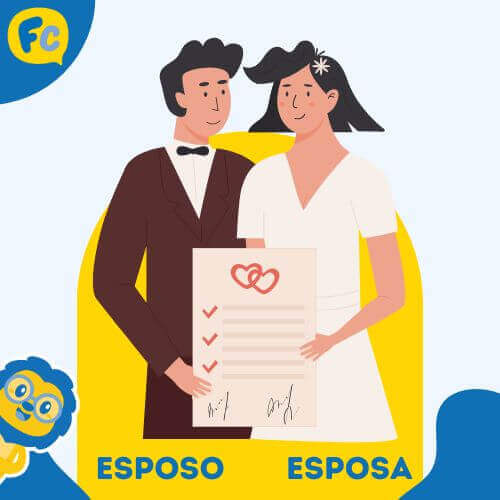
Padres (parents). If used in the plural form, padres, generally refers to the term ‘parents’. 🔏 Note though that, the same word padres, can also refer to ‘fathers’ in the plural.
Padre in singular form means ‘father’.
Madre (mother). In Spanish, an idiom you will often hear is: Madre no hay más que una (literally translating to ‘there is only one mother’), alluding to the fact that she is unique and irreplaceable in one’s life.
Husband and Wife
👉 Marido (husband) and mujer (wife), refer to a married couple. The word spouse translates differently for the wife (esposa) and for the husband (esposo).
| Spanish | english |
|---|---|
| marido | husband |
| mujer | wife |
| esposo | husband (spouse) |
| esposa | wife (spouse) |
Siblings
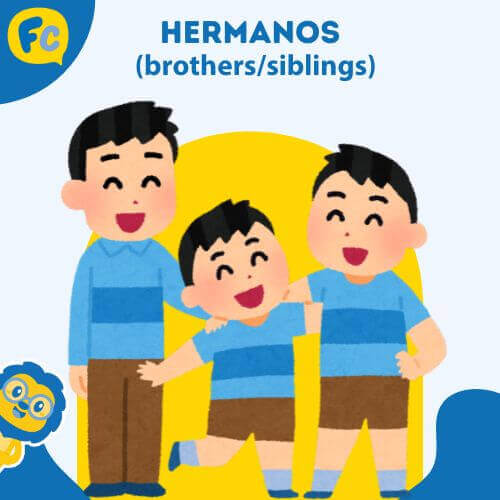
Hermanos (siblings). The word hermanos (plural form) is used as a generic way to refer to ‘siblings’, whether male or female. In singular, hermano, means ‘brother’.
🔏Note as well that the plural hermanos can also refer to ‘brothers’ in the plural form.
Hermanas (sisters), in the plural, when all siblings are female. Singular would be hermana (sister).
Children, Offspring
Hijos (children, offspring). The word hijos, if used in the plural, can refer to either offspring/children (whether male or female) or to the plural of ‘sons’. If used in singular form (hijo), refers only to a ‘son’.
🔏Note that when referring to children as a general concept, the term commonly used is niños (literally translates to ‘boys’ but in reference to ‘kids/children’) and when referring to children as offspring, the correct plural term in Spanish is hijos.
Hijas (children, female offspring), in the plural, when all daughters are female. Singular would be hija (daughter).
Children, All Together
Niños , can refer to the word ‘children/kids’ in general or the plural form of ‘boys’.
Niñas (girls), in the plural, when all are female. Singular would be niña (girl).
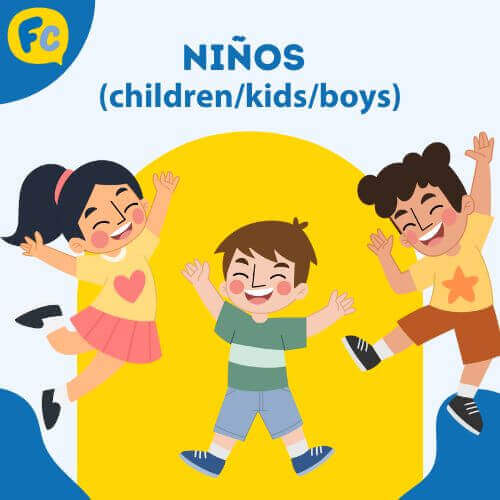
🔎 A tip: As a rule, when referring to a group or unit, the term generally used is the masculine one. Remember this when referring to them. Some examples:
Parents would be padres (and not madres – ‘mothers’)
Siblings would be hermanos (and not hermanas – ‘sisters’)
Children (offspring) would be hijos (and not hijas – ‘daughters’)
Kids would be niños (and not niñas – ‘girls’)
| Spanish | English |
|---|---|
| Padres | Parents |
| Harmanos | Siblings |
| Hijos | Children |
| Niños | Kids |
Family in Spanish ||
We are Family – The Nuclear Family
☀ Nowadays, the majority of Spanish households are composed of two parents and one child. So, the predominant nuclear family in Spain is a unit of three:

| spanish | english |
|---|---|
| Padre | Father |
| Madre | Mother |
| Hijo | Son |
| Hija | Daughter |
🔎A tip: When a child refers to his/her parents, it’s customary to refer to the father as papá and to the mother as mamá .
🔏Note that using papá or mamá in Spain is considered more intimate or exclusive to the family realm.
However, and as opposed to Latin American countries, in Spain, when referring to/speaking of one’s father or mother outside the family unit, it is normal to refer to them more formally, as padre or as madre, respectively.
For example, in the course of a conversation with friends in Spain, one might be asked:
¿Juan, a qué se dedica tu padre?
John, what does your father do for a living?Mi padre se dedica a la construcción.
My father is a builderIn a Latin American Spanish-speaking country, Juan’s answer might look like this:
Mi papá se dedica a la construcción.
My father is a builder🔏 Note that in Spain Juan would use the word padre and not papá when referring to his father in a conversation with friends.
Family in Spanish ||
We Are Also Family – The Extensive Family
The Grandparents
Abuelos (grandparents). The word abuelos is the general way of referring to grandparents, both grandma and grandpa. In singular, abuelo, translates to grandfather and grandmother would be abuela.
| spanish | english |
|---|---|
| Abuelos | grandparents |
| Abuelo | grandfather |
| Abuela | grandmother |
Grandparents in Spain are central to children’s lives and are usually active participants in their upbringing. It is common for instance for Spanish grandparents to look after their grandchildren while the parents are at work or away.
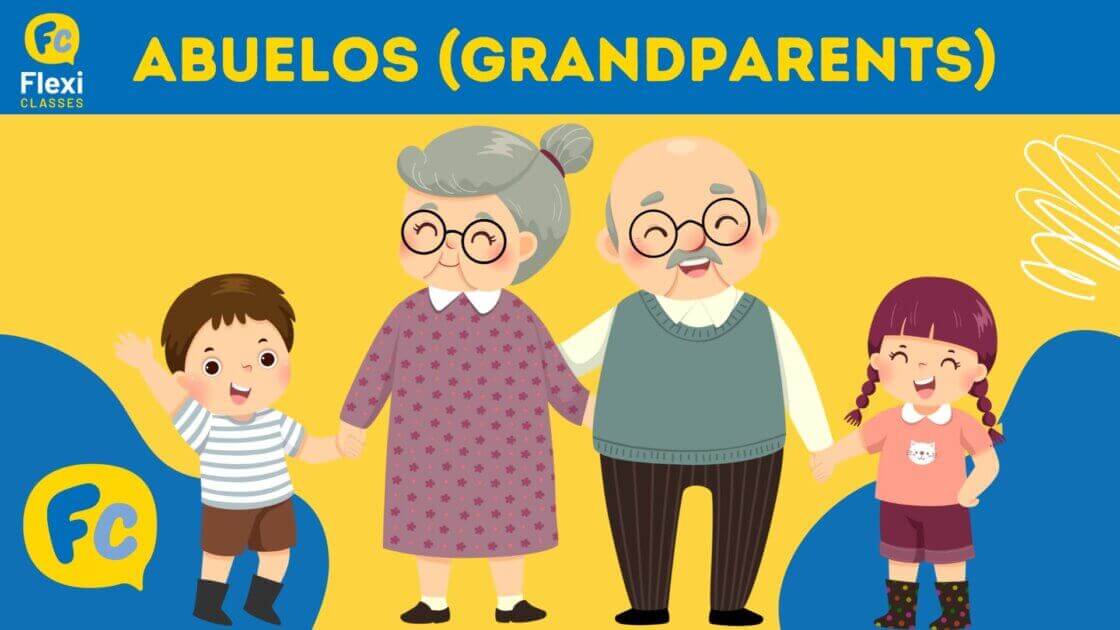
Cousins
👉 As nouns have genders in Spanish, we refer to a cousin as primo if male and as prima if female. In Spain, bonds between cousins after often brotherly or sisterly-like.
📌 Did you know? To differentiate first cousins from more distant ones, Spanish may equally use the term primo hermano or prima hermana when referring to their first cousins, inferring that the cousin is brother or sister-like.
Uncles and Aunts
Tío is uncle and is usually followed by the uncle’s name when addressed. Here is an example:
¿Tío Jorge, me compras un helado?
Uncle George, can you buy me an ice cream?Tía is aunt and as in the case of Uncle George, is usually followed by the aunt’s name when being addressed. Here is another example:
¿Cuándo viene a comer la tía Susana?
When is Aunt Susan coming over for lunch?Nieces and Nephews
👉 When it comes to nieces and nephews, English follows suit and distinguishes between female and male kinship. Accordingly, niece in Spanish is sobrina and nephew is sobrino.]
Family in Spanish || The Extensive,
Extensive Family – The In-Laws
📌 Did you know? As the Spanish saying goes, cuando te casas con alguien, te casas con su familia (which literally translates to ‘when you marry someone, you marry into their family’)
👉 So let’s get to know that extensive, extensive family, your in-laws.
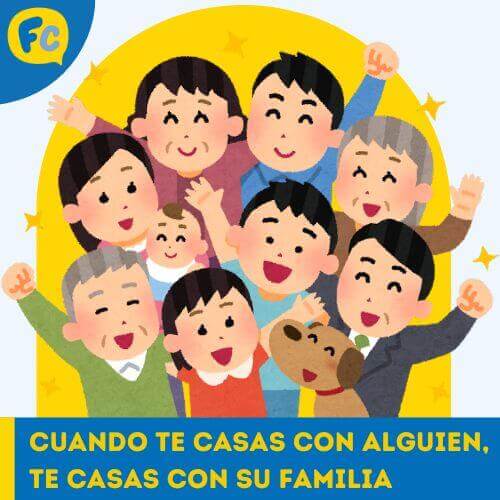
| SPanish | english |
|---|---|
| Suegro | Father-in-law |
| Suegra | Mother-in-law |
| Suegros | In-laws (both) |
| Cuñado | Brother-in-law |
| Cuñada | Sister-in-law |
| Cuñados | In-laws (when referring to both your brother-in-law and his wife; or your sister-in-law and her husband; or your brothers/sisters-in-law in plural) |
| Yerno | Son-in-law |
| Nuera | Daughter-in-law |
Family in Spanish || Quiz
If you enjoyed learning about family in Spanish, why not check out:
And to learn more about Spanish Speaking Countries, check out this!
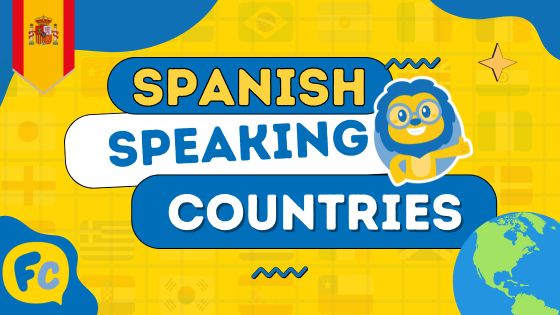
🌎Spanish Speaking Countries – Together we Make 600 Million!
Learn about Spanish Speaking Countries PLUS Similarities and Differences Between Them 😮 WOW! According to studies done as recently as 2023, the Spanish language is spoken or being studied by close to 6️⃣0️⃣0️⃣ million people worldwide. These are the stats:…
Family in Spanish || FAQs
Which surname comes first in Spanish?
As a way of acknowledging both the paternal and the maternal lineage of an individual, Spanish generally use both their surnames (paternal and maternal) and in the reverse order of what is the norm in Anglo-Saxon countries.
In Spain, you’d follow this sequence:
Given name (nombre) + paternal surname (apellido paterno) + maternal surname (apellido materno).
What is familia numerosa in Spain?
To give credit to and honor larger families in Spanish society, Spanish families with three or more children are considered a ‘large family’ (familia numerosa).
This ‘large family’ status entitles them to numerous discounts, benefits, tax reductions, grants and financial assistance in many areas such as public transport, schooling, cultural, educational and recreational activities, housing, etc.
How to refer to your dad in Spanish?
When speaking to your father directly, the use of the term papá (equivalent to ‘dad’) is widespread. However, when referring to your father outside of the family scene, in Spain it is customary to refer to him more formally as padre (father), while in Latin American countries, the use of papá is more common.
Note that the same criteria apply when referring to ‘mom’. Mamá when within the family unit and madre (mother) when referring to her elsewhere.
How to introduce my family in Spanish?
Well, in a similar fashion to how you would do in English, ‘let me introduce you to…’ is similarly used in Spanish: Te presento a…
So a normal introductory conversation could go like this:
Ana Vázquez: Inma, te presento a mi madre. (Inma, let me introduce you to my mother.)
Inma: Encantada de conocerla Sra. Vázquez. (Pleased to meet you Mrs. Vázquez)
Sra. Vázquez: Igualmente Inma, mi hija Ana habla mucho de ti. (Likewise Inma. My daughter Ana often speaks of you.)
How do you say pets in Spanish?
In case you consider your furry friend or your feline companion a part of your family, you can refer to your pets as mascotas or animales de compañía. The term animales domésticos is also acceptable.
Want More From LTL?
FANCY LEARNING SPANISH? Check out our online Spanish courses here.
We offer a 7-day free trial to all online students where you can study Spanish 24/7. It doesn’t end there either.
We teach over 10 of the world’s most popular languages 😎
Come and be a part of our amazing community.









